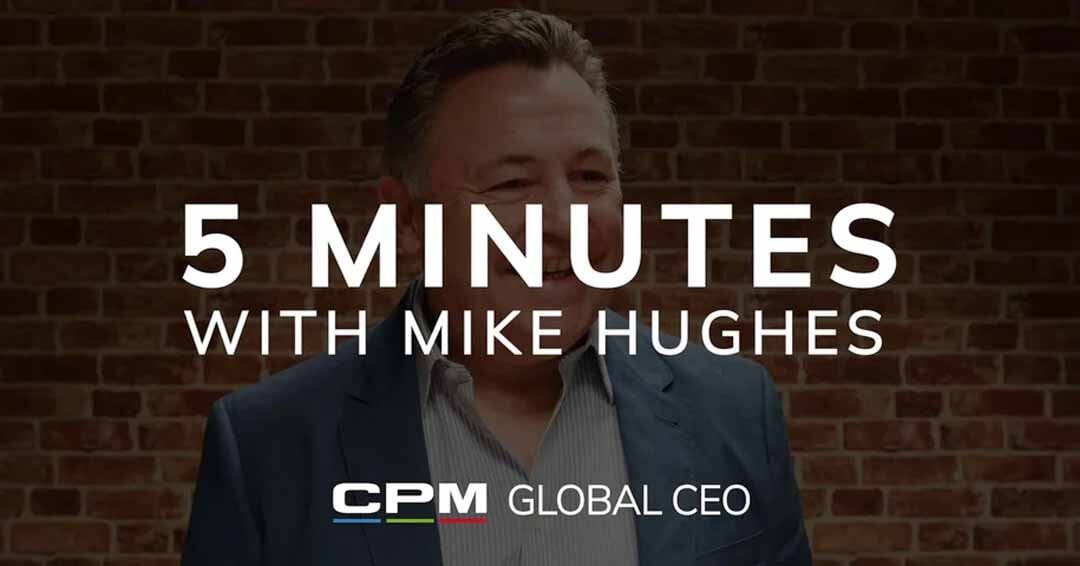
An Interview with Jim McGlynn, CTO of CPM International by Sam Eykyn, Head of Marketing, CPM International
Outsourced Sales, Customer Experience and Field sales is evolving fast, and technology is driving that change. I recently sat down with Jim McGlynn, our Chief Technology Officer at CPM International, a major sales outsourcing company specialising in global field sales, customer experience and international contact centres. With operations spanning continents, CPM International is redefining how brands connect with customers through innovative tech and human expertise. From AI-powered analytics to a ground-breaking data warehouse built in partnership with Microsoft, and the key role of data scientists, Jim shared a vision that’s practical and innovative yet forward-thinking and people-focused.
1. Sam: Thanks for joining me, Jim. Given CPM International’s broad reach, what technology innovations should customers expect from a field sales and customer experience supplier like ours in 2025?
Jim: Thanks for having me, Sam. At a company of our size, with teams in so many places, our customers expect more than just boots on the ground - they want tech that amplifies impact. One big area is AI-powered analytics. We’re delivering real-time campaign insights, from performance metrics to customer sentiment. Our AI doesn’t just crunch numbers; it predicts which locations or demographics will respond best before a campaign launches. It’s about working smarter, not harder, and that’s key for an operation like ours.
2. Sam: That’s an important step up for in-person marketing. What tech are CPM International’s field sales team getting?
Jim: Our field sales team are equipped with smart field tools. A suite that includes mobile apps and systems that can integrate GPS, instant reporting, and dynamic scheduling. If a storm rolls in or foot traffic spikes somewhere unexpected - in the town the sales team are visiting - our systems have the capability of updating routes in real time. It keeps them agile and cuts down on wasted effort. Efficiency is everything in the field; our customers expect efficiency, and so do we. Especially with a company as large as ours.
3. Sam: Speaking of efficiency, how is CPM International handling personalisation in these face-to-face interactions?
Jim: Personalisation is where we’re really standing out. We’re tapping into our unique data warehouse, which holds billions of rows of data, augmented with real-time feeds - think weather, social trends, even local events. This provides us with the ability to create up-to-date, personalised insights for every interaction that no one else can match. For example, a field rep meeting a customer can pull up tailored recommendations based on that person’s past engagement, or a shop's recent sales activity, overlaid with what’s happening in the area right now, like a festival boosting demand for a specific product. It’s hyper-relevant and tough to replicate without our data scale and real-time edge. It has taken years of development, but it is here, now, today, and in use.
4. Sam: Billions of rows of data? Tell me more about the Data warehouse?
Jim: I am a data fanatic! We’ve really built something special. Our global development team built it hand-in-hand with Microsoft themselves. For a company as big as CPM International, we needed something robust, so we partnered with Microsoft. We worked closely with their engineers, using Azure Synapse Analytics, Power BI and some of their advanced analytical tools to create a centralised hub that pulls in data from every campaign, market, and interaction worldwide. A vital point is that it’s not just storage; it’s a living system that will continually evolve, that integrates field data with client CRM, weather patterns, and social media trends, all in real time. That partnership with Microsoft ensures we can scale beyond billions of rows of data and ensure security, handling massive datasets without a hitch.
5. Sam: That sounds like a beast. But why is our data warehouse so important for field sales and all the services we provide at CPM International?
Jim: It’s the backbone of everything we do. It sits at the heart of what we call our Liquid approach – the way we uncover the biggest sales opportunities and use omnichannel dynamic deployment to maximise client results, in a market that constantly changes. Field sales, by its very nature, has always been somewhat fragmented - teams in different cities and countries - and at our scale, that’s a challenge. Without a unified data warehouse, you’re stuck with silos, and that kills insight. You will always just be the same. With our technology and our Warehouse, we see the big picture instantly - how a campaign in one town or country compares to another, or why a product flopped in one shop in one town versus a shop somewhere sunny! It’s about insights, consistency and context. Additionally, modern AI tools help us spot patterns humans might miss, like a sudden uptick tied to a local event.
6. Sam: With all that data Jim, how important is data security to you at CPM?
Jim: Security is everything - I mean everything! Everything we do has security designed into every layer, right from the start. I am very lucky at CPM because we’re backed by Omnicom. They provide us with the resources, tools and controls to implement world-leading data security. Our data warehouse, our apps, our AI tools - they’re all built with the highest standards, leveraging top-tier security features and our own rigorous protocols. We’re handling billions of rows of data and our clients trust us because we’ve got the muscle and the expertise to keep it locked down tight. It’s not an afterthought; it’s the foundation.
7. Sam: What possibilities does this open up for CPM International’s field sales and customer experience services?
Jim: The possibilities are endless for a company our size. For one, hyper-local optimisation - we have the data to enable campaigns to be tweaked on the fly based on real-time trends. Imagine a client launching a new drink: our warehouse flags that certain flavours are trending in shops in some areas but failing in others, so we can help pivot the strategy for major brands. It allows us to be predictive, agile and dynamic in a market in constant flux. It also powers cross-market learning. For example, some tactical work in France can be replicated in Italy within days. As we feed data back into the system, we’re not just adapting, we’re continuously learning, evolving and getting smarter. And for our bigger clients, we can consider seamless integration with their systems via Azure APIs, so their execs see our field data alongside their sales figures in Power BI dashboards. It’s agility and transparency that our clients rely on. As we said, a real Liquid approach.
8. Sam: OK, so the warehouse is clearly a game-changer in the industry. We also have a team of Data Scientists. How important are they to making this work at CPM International?
Jim: Critical. They’re the glue holding our “data-operation” together. With a company as large as ours, and data sets as large as ours, our developers can build the tech, such as apps and warehouse infrastructure, and then the reporting teams can create powerful, slick Power BI visualisations for clients. But Data Scientists are essential for bridging the gap and gaining a vital edge. They review the data in our Data Warehouse and data from clients, and turn it into something meaningful. They uncover the opportunities. They design reusable algorithms to predict trends, clean up data noise, and ensure data is usable for our reporting teams. Without them, our tech wouldn’t talk to the business side effectively enough.
9. Sam: That’s a great way to put it. But explain to me some more how Data Scientists make that bridge happen across CPM International’s operations?
Jim: It’s all about translation. Developers speak in code; how do we capture, store and process data? Reporting teams speak in client needs; what story does this data tell and how do we show ROI? Data scientists sit in the middle (and a little either side too), turning technical outputs into actionable insights and opportunities. For example, they might work with developers to tweak field data collection for better granularity, then help reporting build a dashboard showing campaign performance by region and time of day. They’re fluent in both worlds, ensuring nothing gets lost. Again, they give us the edge, the unique selling point which is vital for a company our size.
10. Sam: Let’s talk about our field sales team. This sounds like a lot of change for them. How is the rise of data changing their world, and what skills do they need to adapt?
Jim: I’ve got so much empathy for our field sales team, because their world is shifting. It’s a lot to take in, especially with a company as big as ours. Data is flooding in thanks to our warehouse and real-time feeds. It is transforming the future of their work. I feel for them; it’s a big change to have all this change, all this info at their fingertips. But, here is the key point; it’s also an opportunity; we need to help them get comfortable with data analysis themselves. Not to become data scientists of course, but to look at a report on their app and spot a trend, like ‘Oh, this product did well in shop “X” last week, but it is not doing well in shop “Y”…I need to investigate.’ It’s about building their skills and confidence to use data as a tool, and not rely on being too spoon-fed. That skill takes time, and will make them sharper and more valuable. Fortunately, we have an excellent Training Academy which enables our teams (and our Clients’) to get this training and confidence and evolve as the market and tech does.
11. Sam: Similarly, Jim, how is AI impacting the field sales teams' world at CPM International - what’s that transition like for them?
Jim: AI is a whole other beast, and again, I really feel for our reps and field sales team navigating this new world; it must be daunting across our workforce. The world is changing so fast, and this AI revolution feels like a major turning point in human history. Think back to the Industrial Revolution, when steam engines flipped manufacturing, or the ‘90s internet boom that rewired how we connect; people had to adapt. Now, AI’s doing the same, predicting customer behaviour and optimising work for our field sales team. I appreciate how unsettling that might feel, like the ground’s moving. They are being pushed to adopt new skills. We are all learning to be relaxed about AI, not scared, to play with it without fear. It’s like when the first phase of the digital revolution arrived, those who embraced it thrived. We all need to retrain. And not to wait to be trained; we must all lean in and be curious. History rewards those who adapt, and our teams can lead the charge.
12. Sam: How does CPM International ensure tech innovations aren’t just gimmicks?
Jim: Great question. I love creating new tech, and it might seem like playing! But it’s actually about solving real problems. Every tool we deploy (AI or the data warehouse for example ) must streamline logistics, boost engagement, or deliver clear metrics. A recent example of AI at CPM, we rolled out an image recognition system that analyses photos of shelves in shops. Our field sales team take a picture, and the AI checks the stock on the shelves, spots misplaced items, or flags when a display is wrong. For our major household retail brand customers, that is a vital USP. The AI can tell if a product is positioned wrongly in one corner or if a competitor’s products are creeping into their own prime space. That’s not a gimmick, that’s actionable insight that brands use to optimise, and our data scientists ensure it’s accurate. Like I said, I am obsessive about data; if it doesn’t move the needle, then we do not need it. Clients pay for results, not tech for tech’s sake.
13. Sam: What should customers ask themselves to get the most out of CPM International’s tools?
Jim: Similar to your last question, it is all about focusing on the goals. Are they after brand awareness, lead generation, or simply sales or brand loyalty? Their focus helps our focus. We can tailor the tech, whether it’s the warehouse for strategy or smart tools for efficiency. At our scale, we’ve got the resources to align our innovations with their vision for the best results.
14. Sam: Looking ahead, Jim, how do you see the future of field sales unfolding for CPM International?
Jim: I’m a techy through and through. I love building systems and playing with new tools, so at a company like CPM International, that’s great because we have a lot of opportunity to change the world. But, first and foremost, I believe in human interactions and that humans will always lead the way. People buy from people. It’s that simple. Tech, like our data warehouse or AI, isn’t here to replace anyone; it’s here to help make us perform better. Field sales, and our customer experience teams and contact centres, thrive because of human interactions, with teams connecting with customers, building trust. No algorithm can fake that. I see a future where the latest tech amplifies human strengths, giving our teams sharper insights and smarter tools to shine. The people who succeed (the sales and customer service teams, the managers, even me) will be the ones who adapt and learn to use modern tech. It’s not about being the most tech-savvy, it’s about being open to change, being curious and using tools to lift your game. That’s where the real wins will come from, and with our size and reach, we’re ready to lead that shift while keeping the human touch front and centre.
Jim McGlynn is Chief Technology Officer at CPM International. His insights paint a picture of a field sales and customer experience future where technology and human expertise work together for augmented results. With CPM International’s data warehouse, built alongside Microsoft, utilising AI and smart tools, and Data Science to fuel our Liquid approach, we’re redefining what’s possible with field sales and customer experience services. We know there is a better way.


 3 minute read
3 minute read


